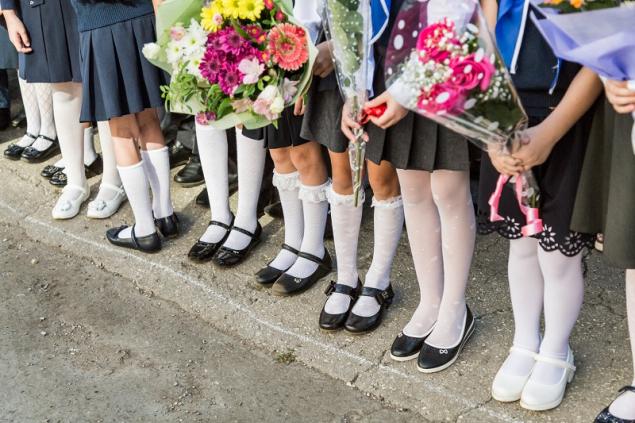184
How to instill a child’s love for school
No one is safe from school, not even the future king. Not so long ago, the heir to the British throne, crumb George of Cambridge, solemnly went for the first time in the first class, and the baby was not capricious in a royal way and showed with all his appearance that he was not delighted with this idea. Each parent clinging to the screen with tenderness looked at the baby and recognized his child in him, who also does not want to get up in the morning for classes and gnaw at the ill-fated granite of science.

DepositPhotos
Many children with tears in their eyes do not want to go to the first grade, and anxiety among older schoolchildren is not news at all. However, concerned parents should not despair ahead of time: to change this attitude to school is quite real and under the power of everyone. "Site" He will tell you what to do if the child flatly refuses to attend classes, and the mere thought of school causes tears and tantrums. Let's deal with it together!
Anxiety, neurosis, phobia - the names are different, but the problem they share is one: The child does not want to go to school. Moreover, fleeting worries before, for example, a test is normal, and constant anxiety is a reason to sound the alarm. The child every morning before classes feels depressed and looking for all sorts of reasons to skip classes, be it abdominal pain or fever?
Parents of such a baby need to understand the source of anxiety, because often the symptoms of a truant are not a simulation, and they are actually manifested due to strong emotional overstrain.

Often anxiety begins to form even before the first grader crosses the school threshold for the first time. Parents of today’s high school students start preparing for Knowledge Day well before September, turning school preparations into a hype, chaos and stress for both themselves and the child.
School interviews, tests, references, knapsacks, notebooks, pens, shirts and bows... And then, when school is close, the first-grader in an ironed shirt begins to wrinkle and capricious at the mere mention of the approaching Knowledge Day. How come? Dad and mom took so long to prepare, put so much effort, and the capricious child doesn't want to go to school?

DepositPhotos
Willy-nilly, the baby went to school, and there is a new uncomfortable environment, pathetic peers and a misunderstanding teacher. What do we do? Parents should actively engage in socialization in first-dayEspecially if the baby has long been shielded from the difficulties and realities of the world.
For example, ask the baby from time to time to perform simple errands in which he will have to show independence: go to the nearest store for bread, go with his grandmother to the market or make an omelet of two eggs. Usually, the period of adaptation in young schoolchildren lasts from a month to six months, and the level of anxiety eventually returns to normal.

DepositPhotos
A separate case is school anxiety in older children. Caused by the situation at school or characteristics of the character, these situations often become a cause for concern for adolescents.

DepositPhotos
Many students are able to cope with the problem on their own, adapt to a stressful situation and find a way out of it. Others need help, and the main mistake of most parents in this situation is to assume that everything will pass by itself.
How can I help a child?
It should be understood that in some cases, when parents are not able to cope with the problem on their own, you will have to seek help from a child psychologist. But the main advice, dear parents, is to let your children make just as many mistakes as they need to make in order to learn something. And let their path be through ignorance, trial and failure, it is in your power to ease it with your faith, love, patience and support.
Be sure to share the article with friends whose children experience special anxiety before school and pathological reluctance to learn.

DepositPhotos
Many children with tears in their eyes do not want to go to the first grade, and anxiety among older schoolchildren is not news at all. However, concerned parents should not despair ahead of time: to change this attitude to school is quite real and under the power of everyone. "Site" He will tell you what to do if the child flatly refuses to attend classes, and the mere thought of school causes tears and tantrums. Let's deal with it together!
Anxiety, neurosis, phobia - the names are different, but the problem they share is one: The child does not want to go to school. Moreover, fleeting worries before, for example, a test is normal, and constant anxiety is a reason to sound the alarm. The child every morning before classes feels depressed and looking for all sorts of reasons to skip classes, be it abdominal pain or fever?
Parents of such a baby need to understand the source of anxiety, because often the symptoms of a truant are not a simulation, and they are actually manifested due to strong emotional overstrain.

Often anxiety begins to form even before the first grader crosses the school threshold for the first time. Parents of today’s high school students start preparing for Knowledge Day well before September, turning school preparations into a hype, chaos and stress for both themselves and the child.
School interviews, tests, references, knapsacks, notebooks, pens, shirts and bows... And then, when school is close, the first-grader in an ironed shirt begins to wrinkle and capricious at the mere mention of the approaching Knowledge Day. How come? Dad and mom took so long to prepare, put so much effort, and the capricious child doesn't want to go to school?

DepositPhotos
Willy-nilly, the baby went to school, and there is a new uncomfortable environment, pathetic peers and a misunderstanding teacher. What do we do? Parents should actively engage in socialization in first-dayEspecially if the baby has long been shielded from the difficulties and realities of the world.
For example, ask the baby from time to time to perform simple errands in which he will have to show independence: go to the nearest store for bread, go with his grandmother to the market or make an omelet of two eggs. Usually, the period of adaptation in young schoolchildren lasts from a month to six months, and the level of anxiety eventually returns to normal.

DepositPhotos
A separate case is school anxiety in older children. Caused by the situation at school or characteristics of the character, these situations often become a cause for concern for adolescents.
- The teenager contracted anxiety from his mother, who endlessly reminds how important high marks, perfectly written test and entrance exams to the university. Such a child is most often afraid that he will be punished at home for poor grades, which in turn causes high levels of stress.
- Very often, teenagers are faced with misunderstanding from teachers, especially the old school, are subjected to daily reproaches and nagging.
- Sometimes, the cause of anxiety is the fear of public speaking, for example, the answer near the board and subsequent ridicule from peers.
- Often, children who worry too much about grades suffer from A.D. syndrome. Such children always try to be the best in everything, constantly compete with their peers and eventually overload themselves with tasks. And there to nervous exhaustion at hand.

DepositPhotos
Many students are able to cope with the problem on their own, adapt to a stressful situation and find a way out of it. Others need help, and the main mistake of most parents in this situation is to assume that everything will pass by itself.
How can I help a child?
- The first thing a responsible parent should do is accept the child’s anxiety, because he has every right to it. Be genuinely interested in the life, thoughts and feelings of the concerned child, his assessments, relations with teachers. Find out what lessons the child likes the most and why, what emotions cause him certain assessments and whether he thinks that he deserves such marks.

DepositPhotos - If your child is going to the first grade, try to introduce him to the future teacher and classmates in advance. Create a positive attitude towards school and the learning process before your child crosses the threshold for the first time. By the way, you can show a few pictures from your school youth or tell a couple of funny stories - in general, show your child as many positive aspects of school time as possible, but also remember to prepare for injustice.
- Explain to your child that there is nothing wrong with not knowing something. Let the child not be afraid to admit his mistakes and not be ashamed that he does not have time to perform some task. Modern schoolchildren are horribly overwhelmed, and adaptation in the first months of school is much harder than ours.
229092
DepositPhotos - Teach the child to draw conclusions from unpleasant situations, whether it is a poor assessment or a quarrel with a classmate. This experience will teach the child to avoid trouble on their own and without unpleasant consequences.
- Be an example to your child. Sincerely share your worries and experiences, talk about your own failures and ways to overcome them. But the main thing is to be happy and balanced, because calm parents have calm children.

DepositPhotos
It should be understood that in some cases, when parents are not able to cope with the problem on their own, you will have to seek help from a child psychologist. But the main advice, dear parents, is to let your children make just as many mistakes as they need to make in order to learn something. And let their path be through ignorance, trial and failure, it is in your power to ease it with your faith, love, patience and support.
Be sure to share the article with friends whose children experience special anxiety before school and pathological reluctance to learn.
How to make a cake with pears in butter
What is the difference between the hygiene rules of European and Russian women


























